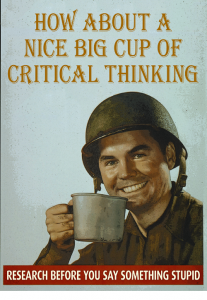
Conspiracy theories, the rumor mill, and propaganda all thrive in a world devoid of critical thinking skills. In a career setting, this kind of lazy thinking can torpedo your chances for advancement.
Examples of an employee who hasn’t mastered critical thinking:
- Developing a marketing plan without a clear audience
- Listening and understanding why a customer is upset with their service
- A limited view of a financial spreadsheet without considering other outside factors
- Or even an entrepreneurial venture without asking yourself why anyone should care about this product are all
The Critical Thinking competency is defined as being able to identify and respond to the needs based on an understanding of the situational context and logical analysis of relevant information.
A new college graduate should be able to:
- Gather and analyze information from a variety of sources to fully understand of a problem
- Accurately summarize and interpret data
- Make decisions and solve problems using sound reasoning and judgment
- Proactively anticipate needs and prioritize actions steps
- Effectively communicate actions an rationale to stakeholders

Your professors are consistently helping you build your critical thinking in the classroom whether you are required to participate in literary analysis of particular characters in Shakespearean plays or in a debate regarding economic development in a post-Civil War reconstruction of the South. But in a real world setting, you may find yourself as a customer service representative trying to assist a client with a technical glitch with their software system. As an associate you may have to decide who to invite to the meeting regarding the companies new internal communication plan. All of these situations should force you to pause and think about the entire scenario, who is impacted, and then how to proceed.
How do you address critical thinking in an interview? Here’s a common sample interview question, but consider how you approached the problem through critical thinking.
Tell me about a time a client/customer was angry about their service. What happened and what did you do about it?
“My parents own their restaurant business and I work there every summer and this past summer I was a supervisor so I had added responsibility in training the servers. One evening we had a client that was not happy when their meal arrived at the table and was clearly upset with the server. I went over to see what I could do to solve the problem. The meal looked fine, and prepared the way it normally would be – but there was a significant problem. The customer wanted to have the meal remade. After asking more clarifying questions, I learned the customer was very allergic to peanuts – and on top of the asparagus were chopped nuts. The customer was so upset because she was scared she was going to have a reaction, and in her reaction she forgot to explain why she was so upset. Once we had that clarified, we made a new meal, adjusted her bill to show goodwill, and retrained our servers to ask for any allergies our customers might have when taking orders.”
Competencies Highlighted: Critical Thinking, Professionalism, Communication, Problem Solving